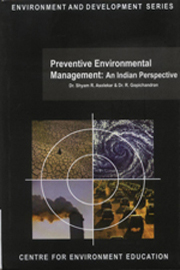Book contents
- Frontmatter
- Foreword
- Acknowledgements
- Contents
- List of Figures
- Summary
- Preface
- The Contents
- Preventive Environmental Management Tools
- Preventive Environmental Management Initiatives
- 9 Identification of Potential Interventions
- 10 Greener Chemistry and Cleaner Technologies
- 11 Greener Choices in Process Industry
- 12 Redesigning of Unit Operations and Unit Processes
- 13 Recycle and Reuse of Wastewater
- 14 Sustainable and Intelligent Consumption
- 15 Extended Producer Responsibility
- 16 Eco-industrial Networks
- Overarching Issues
- References
- Bibliography
- Web-Resources
- About the Authors
- Abbreviations
- Index
14 - Sustainable and Intelligent Consumption
from Preventive Environmental Management Initiatives
Published online by Cambridge University Press: 05 November 2011
- Frontmatter
- Foreword
- Acknowledgements
- Contents
- List of Figures
- Summary
- Preface
- The Contents
- Preventive Environmental Management Tools
- Preventive Environmental Management Initiatives
- 9 Identification of Potential Interventions
- 10 Greener Chemistry and Cleaner Technologies
- 11 Greener Choices in Process Industry
- 12 Redesigning of Unit Operations and Unit Processes
- 13 Recycle and Reuse of Wastewater
- 14 Sustainable and Intelligent Consumption
- 15 Extended Producer Responsibility
- 16 Eco-industrial Networks
- Overarching Issues
- References
- Bibliography
- Web-Resources
- About the Authors
- Abbreviations
- Index
Summary
Sustainable Consumption was identified during the Rio Summit of 1992, as the key challenge for ensuring sustainability and thus became the subject of Chapter 4 of Agenda 21. Almost ten years from the Rio Summit, discussion on this challenge is continuing around the globe. Analysis of trends, for the period, 1950 to the early 1990s shows that world population has increased more than two folds (2.2 times), food production has increased almost threefolds (2.7 times), energy output by more than four-fold (4.4 times), and the economic performance by more than five-folds (5.1 times). This increasing trend of consumption is worrisome as predicted by the Boston: Stockholm Environmental Institute. It has been predicted that over the next 50 years the growth rates of consumption could continue well beyond that of population if we assume a ‘business as usual’ scenario [Heap, 2000].
Strain on the environment, pollution, destruction of ecosystems, and undermining of quality of life are some of the undesired effects of the ever-increasing consumption patterns. Poverty and deprivation are increasing at an alarming pace alongside disparity in incomes and consumption as a common feature in all the countries; especially so in the developing countries. The resultant growing inequities are also not socially acceptable. The need of the day is to learn to husband consumption in an equitable manner and ensure environmentally and socially sustainable patterns of consumption [Ruffing, 1998; Masera, 2001].
- Type
- Chapter
- Information
- Preventative Environmental ManagementAn Indian Perspective, pp. 392 - 423Publisher: Foundation BooksPrint publication year: 2005



